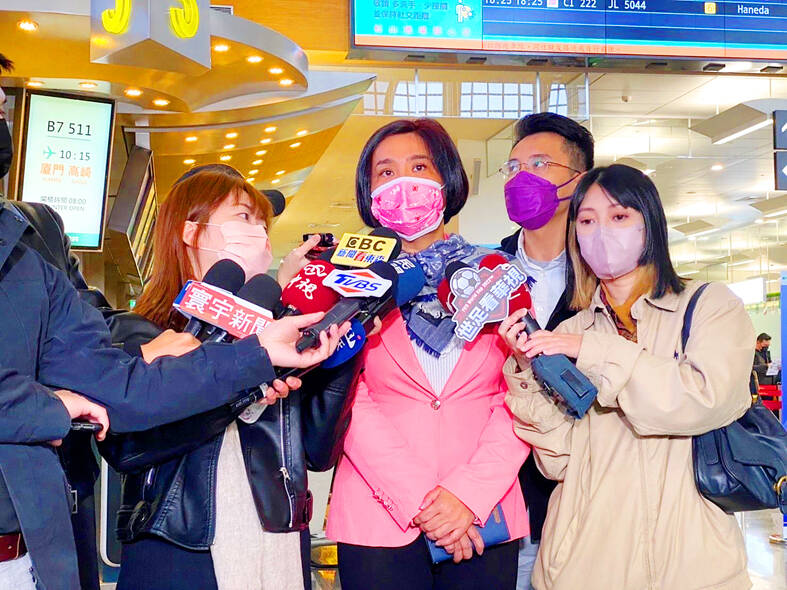A group of Chinese Nationalist Party (KMT) lawmakers and newly elected county commissioners yesterday arrived in Xiamen to meet with Chinese officials, days after Beijing extended effective bans on Taiwanese exports to include liquor and more types of seafood.
Chen Fu-hai (陳福海) and Wang Chung-ming (王忠銘), who are to take office as Kinmen and Lienchiang county commissioners respectively on Dec. 25, arrived in China’s Fujian Province yesterday afternoon.
They were joined by KMT legislators Jessica Chen (陳玉珍) from Kinmen and Chen Hsuen-sheng (陳雪生) from Lienchiang County, and Lienchiang County Council Speaker Chang Yuan-chiang (張永江).

Photo courtesy of Chen’s office
They were reportedly given special permission to forgo COVID-19 quarantine for their two-day trip, and are to return at 6pm today.
Jessica Chen told reporters at Kinmen Airport that the group was invited to discuss the recent suspensions of Taiwanese imports and the resumption of the “small three links” with officials responsible for Taiwan affairs.
Travel between the counties and China’s Fujian Province has been difficult since the links were suspended on Feb. 10, 2020, due to the COVID-19 pandemic.
Now that pandemic-related border restrictions have been eased for the rest of the country, county residents are calling for the restoration of the small three links, which allow for direct transportation, postal services and trade with China.
With the small three links suspended, it has been difficult to develop Kinmen’s economy, Jessica Chen said.
With exports of Kinmen Kaoliang Liquor Inc to China suspended, she said she fears another large blow to the county’s economy and tax revenue.
During their visit, she said that representatives are to discuss the reasons behind the suspensions, as well as protocols for Taiwanese traveling to China once the small three links are reinstated.
She said that in December last year, she invited Cabinet officials to the legislature to respond to concerns about the new Chinese import registration rules and the effect it might have on liquor exports.
A decision was reached at that meeting to seek an explanation from Beijing and to assist Kinmen Kaoliang with any needed documentation, but a year later, the issue remains unresolved, she said.
The delegation is traveling to China to better understand the problem to help stakeholders in Taiwan, she said.
In response to questions about the trip, Presidential Office spokesman Xavier Chang (張惇涵) yesterday reiterated a comment from President Tsai Ing-wen’s (蔡英文) Double Ten National Day speech, in which she said she “looks forward to the gradual resumption of healthy and orderly cross-strait people-to-people exchanges.”
However, any decision regarding the small three links depends on developments in the pandemic and the overall cross-strait situation, he added.
Premier Su Tseng-chang (蘇貞昌) raised concern over the rise in COVID-19 cases in China, saying that it could harm the health of Taiwanese if the nation opens its borders.
Additional reporting by Chen Yun and Hsu Tzu-ling

POSITIVE DEVELOPMENT: Japan and the US are expected to hold in-depth discussions on Taiwan-related issues during the meeting next month, Japanese sources said The holding of a Japan-US leaders’ meeting ahead of US President Donald Trump’s visit to China is positive news for Taiwan, former Japan-Taiwan Exchange Association representative Hiroyasu Izumi said yesterday. After the Liberal Democratic Party’s landslide victory in Japan’s House of Representatives election, Japanese Prime Minister Sanae Takaichi is scheduled to visit the US next month, where she is to meet with Trump ahead of the US president’s planned visit to China from March 31 to April 2 for a meeting with Chinese President Xi Jinping (習近平). Japan and the US are expected to hold in-depth discussions on Taiwan-related issues during the

‘LIKE-MINDED PARTNER’: Tako van Popta said it would be inappropriate to delay signing the deal with Taiwan because of China, adding he would promote the issue Canadian senators have stressed Taiwan’s importance for international trade and expressed enthusiasm for ensuring the Taiwan-Canada trade cooperation framework agreement is implemented this year. Representative to Canada Harry Tseng (曾厚仁) in an interview with the Central News Agency (CNA) said he was increasingly uneasy about Ottawa’s delays in signing the agreement, especially as Ottawa has warmed toward Beijing. There are “no negotiations left. Not only [is it] initialed, we have three versions of the text ready: English, French and Mandarin,” Tseng said. “That tells you how close we are to the final signature.” Tseng said that he hoped Canadian Prime Minister Mark Carney

President William Lai (賴清德) yesterday bestowed one of Taiwan’s highest honors on Saint Vincent and the Grenadines (SVG) Ambassador Andrea Clare Bowman in recognition of her contributions to bilateral ties. “By conferring the Order of Brilliant Star with Grand Cordon on Ambassador Bowman today, I want to sincerely thank her, on behalf of the Taiwanese people, for her outstanding contribution to deepening diplomatic ties between Taiwan and SVG,” Lai said at a ceremony held at the Presidential Office in Taipei. He noted that Bowman became SVG’s first ambassador to Taiwan in 2019 and

A man walks past elementary school artworks at the Taipei Lantern Festival in Ximen District yesterday, the first day of the event. The festival is to run from 5pm to 10pm through March 15.